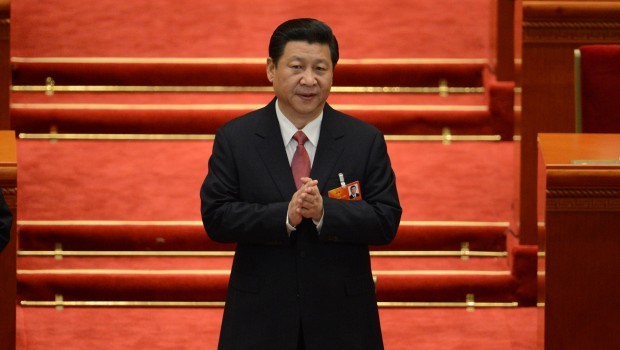
Chinese President Xi Jinping walks to his seat prior to the election for the new president of China during the 12th National People’s Congress (NPC) in the Great Hall of the People in Beijing on March 14, 2013. Source: AFP PHOTO /GOH CHAI HIN
The largely rubber-stamp National People’s Congress chose Xi in a tightly scripted ceremony at the Great Hall of the People in central Beijing, putting the final seal of approval on a generational transition of power.
Xi was appointed party and military chief—where real power lies—in November.
The 59-year-old was also elected head of the Central Military Commission, a parallel government post to the party’s top military position which he already holds, ensuring that he has full power over the party, state and armed forces.
There was virtually no opposition among the carefully selected legislators to Xi becoming president. Xi drew just one no vote and three abstentions from the almost 3,000 delegates.
Xi bowed deeply and shook hands with his predecessor Hu Jintao upon the announcement of the result, carried live on state television. Xi and Hu exchanged a few inaudible words.
Li Yuanchao was also elected vice president, confirming an earlier Reuters story.
There were five other candidates put forth for the vice-presidential position including Wang Yang, the reformist former party chief of southern Guangdong province, and propaganda tsar Liu Yunshan. Xi had fended off a bid by influential former president Jiang Zemin to install Liu, a source with ties to the leadership said.
Vice Premier Li Keqiang is set to succeed Premier Wen Jiabao in a similarly scripted vote on Friday.
Hu, 70, relinquished the presidency after serving the maximum two five-year terms.
Hu’s accession to president a decade ago marked Communist China’s first peaceful transition of power. Violent events such as the Cultural Revolution and the 1989 Tiananmen crackdown on pro-democracy demonstrators overshadowed previous hand-overs.
Since taking up the much more powerful post of party chief last November, Xi has focused on fighting corruption and promoting austere practices such as banning senior military officers from holding alcohol-fueled banquets.
Many Chinese hope Xi will bring change in a country that has risen to become the world’s second-biggest economy but is marred by deepening income inequality, corruption and environmental destruction left over from the administration of Hu and Wen.
For Yan Chengzhong, a delegate to the legislature, the most pressing task for Xi’s government is to clean up the environment.
“I come from Shanghai, where there are 6,000 dead pigs floating in the river. It speaks to how fragile the ecological environment is,” said Yan, who said he had submitted a proposal to the legislature urging government transparency on the environment.
“At this meeting, there’ve been very strong voices concerning the condemnation of the bad environmental situation,” Yan said. “I think these kinds of voices can be accepted by the new authorities. It’s a favourable opportunity for the new leaders to do something different.”
Gong Funeng, a delegate from the southwestern province of Sichuan, said: “The most challenging problem that the government faces now is on implementing political reform and fighting corruption.”
Xi inherits a constituency that is more distrustful of government and well-versed at using the Internet to criticize their leaders.
At the same time, his administration must deal with a slowdown in economic growth, juggle the urgent task of calming a frothy housing market, defuse local government debt risks and wean China off its addiction to investment-led expansion.
Xi will also have to deal with an increasingly provocative North Korea and tension with the United States, Japan and Southeast Asia.
The son of reformist former vice premier and parliament vice-chairman Xi Zhongxun, Xi has used state media to craft a folksy, low-key image, often using plain language, in contrast with predecessors who often clogged speeches with party jargon.
But Xi’s administration has indicated that the party, which values stability above all else, continues to brook no challenge to its power.
Prominent dissident Hu Jia told Reuters police summoned him on Wednesday afternoon on a charge of “provoking quarrels and making trouble”.
Hu said he believed it could be due to him organizing visits by activists to the home of Liu Xia, the wife of jailed Nobel Laureate Liu Xiaobo, who has been under house arrest since Liu’s award.
“Or it could also be that during the parliament session, I’ve published numerous critical opinions of the Communist Party,” he said.
